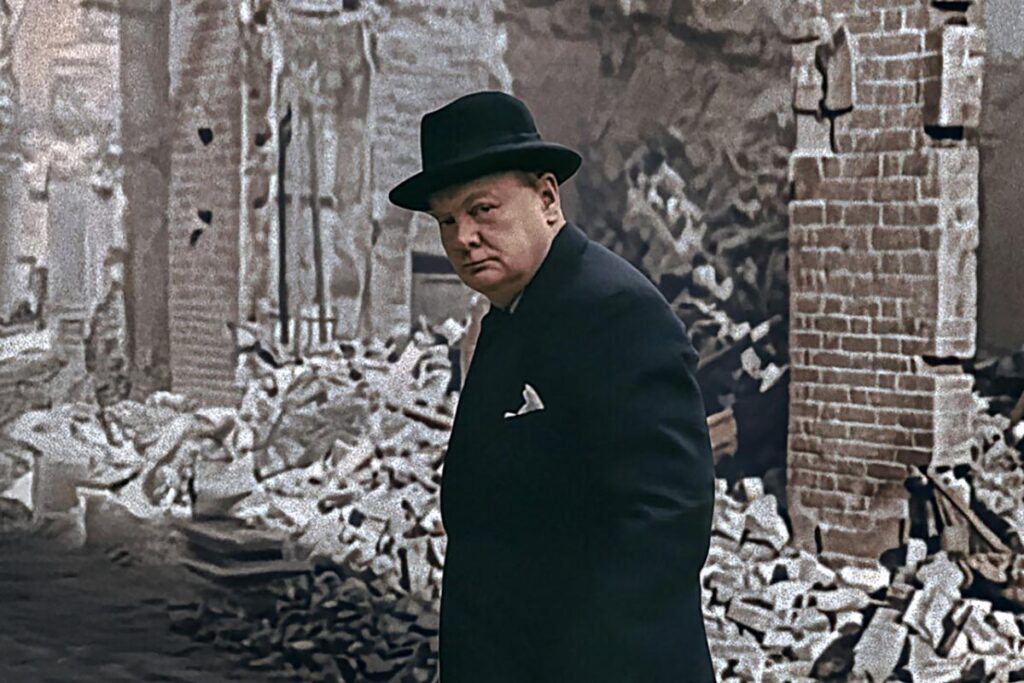You’ve seen some of the iconography in Britain and the Blitz (now on Netflix) before, but maybe not quite like this. The documentary from director Ella Wright consists wholly of first-person voiceover accounts and colorized archival footage that has been, per an opening title card, “combined to create an immersive experience,” and it brings to life images of Winston Churchill and St. Paul’s Cathedral that have become symbolic of British patriotism. So consider this on-the-ground chronicle of the Blitz – a brutal, but ultimately failed eight-month German air-raid offensive that Hitler launched in Sept. 1940 to break Britain’s spirit – to be a World War II equivalent of Peter Jackson’s 2018 World War I doc They Shall Not Grow Old.
The Gist: Throughout the 77 minutes of Britain and the Blitz, we’ll “meet” several survivors of this horrible ordeal: Eric Brady, who was five years old when he survived the bombing of his school – although many of his classmates and teachers weren’t so lucky. Richard Holsgrove, who at 17 worked as a junior fireman, working to control the seemingly endless fires throughout London. Joan Wyndham, a 17-year-old art student who partied at clubs even while bombs rained upon the city, whose diaries from the time made her a writer of some prominence. Edith Heap, 21, who was among a motivated female work force during the war, employed as a plotter for the Royal Air Force, tracking planes. Eric Betts, who lost his mother at age 12 when their bomb shelter was hit, and ended up living with foster parents.
These stories are the film’s primary narrative load-bearing support beams, providing intimate details of survival within a larger story we’re likely already familiar with, namely, Britain’s seemingly improbable ability to withstand dozens upon dozens of bombing raids spread out over 240 days during 1940-41. The individual accounts of these people don’t just emphasize what happened during that time – they share personal stories of love and romance, of tragedy and heartbreak, as these people, all notably quite young, came of age during a time of extreme hardship that ultimately defined the rest of their lives.
Wright weaves in other details to fill out some of the background for these stories. Most notable is first-person commentary from German Luftwaffe pilots (one of whom calls Hitler’s ruthless strategies to bomb civilians “completely idiotic”), and just enough context to complete a loose who-what-where-when-why sketch of the big-picture narrative. The filmmaker couples footage of British Prime Minister Winston Churchill and the Royals touring bombed-out portions of London with their corresponding radio addresses (including one from then-14-year-old Princess Elizabeth), and includes powerful images of St. Paul’s Cathedral standing tall among smoke and fire, which would become a symbol of British resilience. Wright also foregoes the usual talking-head commentary for the very end, saving an emotional reveal for when it carries the most dramatic impact.
What Movies Will It Remind You Of?: Director Steve McQueen dramatized the street-level experience of the Blitz in 2024’s underrated Blitz – so apply that point-of-view to They Shall Not Grow Old and you’ve pretty much got Britain and the Blitz.
Performance Worth Watching: No spoilers, so like I said, hold out until the final moments for some heart-wrenching stuff.
Memorable Dialogue: Wyndham writes a poignant emotional portrait of love, life and death during the Blitz as she contemplates giving up her virginity: “I can’t help feeling that each moment may be my last. And if the opposite of death is life, I think I shall get seduced by Rupert tomorrow.”
Sex and Skin: None.
Our Take: Britain and the Blitz states right up front that immersion is the goal here, and unlike many traditional historical docs that tend to relay audio and visual information with dry detachment, it often creates a tactile sensation of being on the ground and present for the bombings. It inevitably begs further comparison with Jackson’s They Shall Not Grow Old, both documentaries enlivening the presentation of such events with (surely painstaking) restoration and colorization of footage that might otherwise be derivative of countless other films. Setting aside any objections from purists – please note that this type of restoration is far from the blasphemy of Ted Turner’s controversial colorization of classic Hollywood films – consider both to be a successful upscaling of the viewing experience. Some of this imagery is hard to shake.
However, Jackson’s work was far more focused in its narrative and sourcing, culling all audio from archived interviews with British soldiers and following the stories of these men in linear fashion, from the moments they decided to run away from home to fight to the time they returned home entirely different people. Wright’s film casts a much larger net and tackles a broader array of stories – and gives one the sense that she had to work within the limitations of the available audio and video. The film is opaque about its audio sourcing – the vast majority of the narration is first-person, but whether it’s from archival or recent interviews, or by voice actors (one assumes this is the case with readings from the diaries of Wyndham, who died in 2007).
These issues don’t torpedo the film, though. Obviously, no documentarian is going to cover both right- and left-brain angles on the Blitz in 77 minutes, so Britain and the Blitz leans heavily to the former (and likely assumes we can fill in historical gaps with a trip to Wikipedia, which helped refresh me on, say, why Hitler gave up on the bombing campaign (his strategy was disorganized and he had shifted his attention to Russia)). Wright covers a few compelling angles, including women’s contributions to the war effort and the heartache families felt when they put their children on trains and sent them to the countryside, away from military targets. The film is a piecemeal endeavor that essentially exists to show us this footage and tell us the stories of people who lived through the catastrophe – and both are more than worthy of our attention.
Our Call: Although it lacks a thematic polestar, Britain and the Blitz is nevertheless a refreshing account of familiar historical events. STREAM IT.
John Serba is a freelance writer and film critic based in Grand Rapids, Michigan.
Read the full article here








